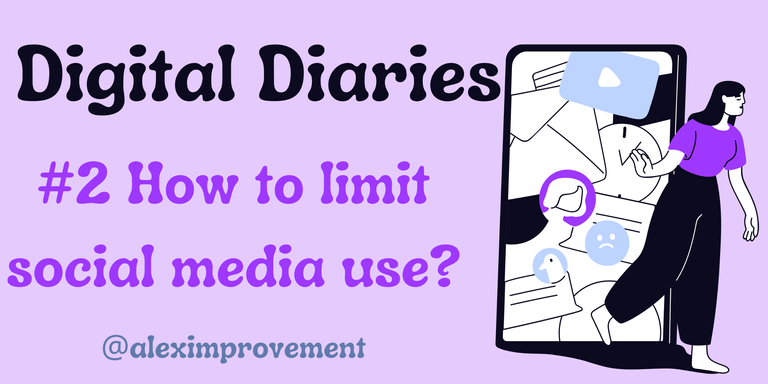
Hello and welcome! :)
It's been a while since I decided to limit my social media use. I can safely say that mentally I feel much better and have more time for things that bring me better results than sitting and scrolling through various apps.
How do you reduce your time in front of the screen?
In this post, I'd like to share what has helped me cut down on social media and the steps I've taken to reduce my time in front of the screen.
Turning off notifications.
I decided to turn off notifications a long time ago. I had the problem that every time a notification popped up, I would immediately have the urge to check my phone, and one such check could turn into a long time of scrolling. I only left notifications from the apps through which I interact with people. This has ensured that I don't have the need to reach for my phone on impulse.Phone-free mornings.
Often the first thing I did when I woke up was reach for my phone. I would then check what friends were sending and fumble around on various apps. Suddenly it would be an hour and a half since I got up and I still hadn't done anything, and on top of that, I was already tired. Now, the first thing I do as soon as I switch off the alarm clock is put my phone in the cupboard. This makes it disappear from my field of vision as I focus on my morning routine. I get up around 7/8 a.m. and am only reminded of my phone around 11 a.m. I also feel better about this because I have a "clear head" immediately upon waking up.Time limit for selected apps.
On my previous phone I used the social media timeout feature a long time ago. It was, unfortunately, ineffective, as it was literally one click to turn off the notification that indicated that my designated time on a particular app had ended. Of course, for the first few days I stuck to the resolution, but as you can guess, I soon forgot about it and the time limit became just an annoying notification. Now I set myself time limits on selected apps using the StayFree app, which I highly recommend because when you close the notification, it closes the whole app. The quote that appears on the screen is also a big plus, which motivates me to put the phone down every time.Screen time shown on the start screen.
Previously, I hadn't realised how much time I was actually spending in front of the screen. I decided to put a widget on my start screen that shows how much time I have spent using my phone in a given day. I set myself specific time goals every day and this way helps me achieve them.Planning the day.
Since I've started planning my day, especially my morning routine, I don't have any 'gaps' in my day where I don't know what to get done and I reach for my phone because I just know what I need to do that day. I also often set specific times when I am going to study, prepare something to eat or go out for a walk. This is very helpful because I can stick to my resolution and be more productive.Telling others.
I didn't expect that sharing my resolution with others would have such a good effect. It turned out that a person close to me also decided to significantly reduce their time in front of the screen and after time we share our thoughts and effects together. This is also a benefit because when we are not motivated to stick to a resolution, someone can remind us of it.
My thoughts.
I've noticed recently how popularised the use of the internet, social media, or gadgets in general like phones, laptops, etc. has become. On the one hand, I understand that this is a good thing in terms of, for example, having more opportunities to have an extra source of income, or even your main job, but it has come to my attention that using a phone has now become something that no human being can do without. Of course, I don't want to lump everyone together, however, I believe that society is too ignorant on the subject. Recently, during my English tutoring sessions, I found this picture in a fourth-grade textbook:

I remember the topic of the day's routine in primary school. At the time, I wrote that in the afternoons I would go out on my bike, play with friends, play on the computer, read, do homework. Now I have noticed that it has become part of the routine to watch TV, talk to friends online (instead of meeting in person) and play video games. I find it distressing that children as young as 10/11 years old are learning that this is what someone's daily routine looks like and there is nothing strange about it. With the rise of technology and the popularity of social media, it is becoming normal that many people are more inclined to spend time in front of screens rather than on physical or social activities.
What do you guys think about this topic? Feel free to share your thoughts in the comments.
Stay tuned. ♥

Witam i zapraszam! :)
Odkąd postanowiłam ograniczyć swoje korzystanie z mediów społecznościowych minęło już trochę czasu. Mogę śmiało stwierdzić, że psychicznie czuję się dużo lepiej i mam więcej czasu na rzeczy przynoszące mi lepsze efekty niż siedzenie i scrollowanie różnych aplikacji.
Jak zmniejszyć swój czas przed ekranem?
W tym wpisie chciałabym podzielić się tym, co pomogło mi w ograniczeniu mediów społecznościowych i jakie kroki podjęłam, aby zredukować czas spędzany przed ekranem.
Wyłączenie powiadomień.
Na wyłączenie powiadomień zdecydowałam się już dawno temu. Miałam problem z tym, że za każdym razem, gdy pojawiało się jakiekolwiek powiadomienie, ja od razu miałam chęć sprawdzenia telefonu, a jedno takie sprawdzenie mogło przerodzić się w długi czas scrollowania. Zostawiłam jedynie powiadomienia z aplikacji, dzięki którym kontaktuję się z ludźmi. To sprawiło, że nie mam potrzeby sięgania po telefon pod wpływem impulsu.Poranki bez telefonu.
Często pierwszą rzeczą, którą robiłam po przebudzeniu, było sięgnięcie po telefon. Następnie sprawdzałam, co wysyłali znajomi i błądziłam po różnych aplikacjach. Nagle okazywało się, że minęło półtorej godziny odkąd wstałam, a ja jeszcze nic nie zrobiłam, i w dodatku, jestem już zmęczona. Teraz pierwszą rzeczą, którą robię od razu po wyłączeniu budzika, to schowanie telefonu do szafki. Przez to znika on z mojego pola widzenia, gdy skupiam się na mojej porannej rutynie. Wstaję około 7/8, a o telefonie przypominam sobie dopiero około godziny 11. Czuję się z tym lepiej również dlatego, że od razu po przebudzeniu mam "czystą głowę".Limit czasu na wybrane aplikacje.
Na poprzednim telefonie używałam funkcji limitu czasu na media społecznościowe już dawno temu. Było to niestety mało efektywne, ponieważ dosłownie jednym kliknięciem można było wyłączyć powiadomienie, które wskazywało, że mój wyznaczony czas na danej aplikacji się skończył. Oczywiście przez pierwsze kilka dni trzymałam się postanowienia, ale jak można się domyślić, szybko o nim zapomniałam i limit czasu stał się jedynie denerwującym powiadomieniem. Teraz ustawiam sobie limity czasowe na wybrane aplikacje za pomocą aplikacji StayFree, którą bardzo polecam, ponieważ przy zamknięciu powiadomienia, zamyka się nam cała aplikacja. Dużym plusem jest też pojawiający się na ekranie cytat, który za każdym razem motywuje mnie do odłożenia telefonu.Czas przed ekranem pokazany na ekranie startowym.
Wcześniej nie zdawałam sobie sprawy z tego, jak dużo czasu faktycznie spędzam przed ekranem. Postanowiłam na moim ekranie startowym umieścić widget, który pokazuje, ile czasu w danym dniu spędziłam korzystając z telefonu. Codziennie wyznaczam sobie konkretne cele czasowe i ten sposób pomaga mi je osiągnąć.Planowanie dnia.
Odkąd zaczęłam planować swój dzień, a w szczególności poranną rutynę, nie mam w nim żadnych "luk" czasowych, w których nie wiem za co się zabrać i sięgam po telefon, ponieważ po prostu wiem, co muszę zrobić danego dnia. Często też ustalam konkretne godziny, w których zamierzam się uczyć, przygotować coś do jedzenia, czy wyjść na spacer. Jest to bardzo pomocne, ponieważ mogę trzymać się mojego postanowienia i być bardziej produktywna.Powiedzenie innym.
Nie spodziewałam się, że podzielenie się z innymi moim postanowieniem, będzie miało tak dobre skutki. Okazało się, że bliska mi osoba również postanowiła znacznie ograniczyć swój czas przed ekranem i po czasie wspólnie wymieniamy się przemyśleniami i efektami. Jest to również korzyścią, ponieważ w sytuacji, w której nie będziemy mieć motywacji do trzymania się postanowienia, ktoś może nam o nim przypomnieć.
Moje przemyślenia.
Zauważyłam ostatnio, jak bardzo spopularyzowane stało się korzystanie z internetu, mediów społecznościowych, czy ogólnie gadżetów typu telefon, laptop, itp. Z jednej strony rozumiem, że jest to dobre, jeśli chodzi na przykład o większe możliwości posiadania dodatkowego źródła dochodu, albo nawet swojej głównej pracy, ale zwróciłam uwagę na to, że korzystanie z telefonu stało się teraz czymś, bez czego nie może obyć się żaden człowiek. Oczywiście nie chcę wrzucać wszystkich do jednego worka, jednakże uważam, że społeczeństwo jest zbyt mało świadome w tym temacie. Ostatnio podczas moich korepetycji z języka angielskiego znalazłam taki obrazek w podręczniku do czwartej klasy:

Pamiętam, jak sama przerabiałam temat rutyny dnia w szkole podstawowej. Pisałam wtedy, że popołudniami wychodzę na rower, bawię się z przyjaciółmi, gram na komputerze, czytam, odrabiam lekcje. Teraz zauważyłam, że częścią rutyny stało się oglądanie telewizji, rozmawianie ze znajomymi w internecie (zamiast spotkania na żywo) i granie w gry wideo. Jest to dla mnie przykre, że dzieci w wieku 10/11 lat uczą się, że tak wygląda czyjaś codzienna rutyna i nie ma w tym nic dziwnego. Wraz z rozwojem technologii i popularnością mediów społecznościowych, normalne staje się to, że wiele osób jest bardziej skłonna do spędzania czasu przed ekranami niż na aktywnościach fizycznych czy społecznych.
To be honest, I’ve been experiencing this social media frenzy for quite a while now. Online and screen time do affect the way how we use social media and our time in general. These tips are surely helpful for me… as someone who’s trying to change my social media usage. Thanks for these insights!
You're welcome!!
I think number 4 and 5 will be a game changer when I implement it. I've noticed there are gaps within my day that I have nothing to do and during these moments it seems easy to slip and check on my phone or worse log in on social media. I think planning the day ahead will be a great way to solve that.
Thanks for sharing!
Hello aleximprovement!
It's nice to let you know that your article will take 12th place.
Your post is among 15 Best articles voted 7 days ago by the @hive-lu | King Lucoin Curator by szejq
You receive 🎖 0.1 unique LUBEST tokens as a reward. You can support Lu world and your curator, then he and you will receive 10x more of the winning token. There is a buyout offer waiting for him on the stock exchange. All you need to do is reblog Daily Report 224 with your winnings.
Buy Lu on the Hive-Engine exchange | World of Lu created by szejq
STOPor to resume write a wordSTART